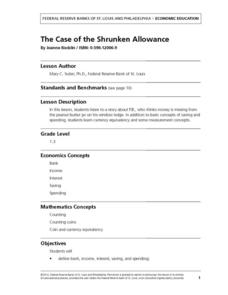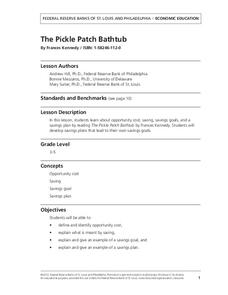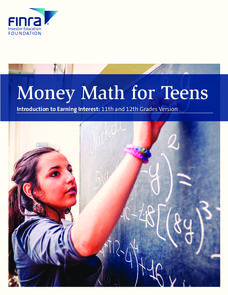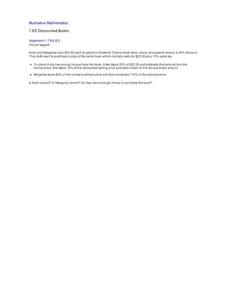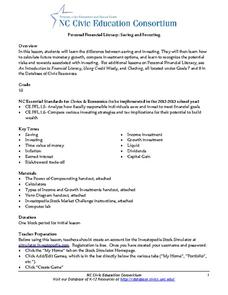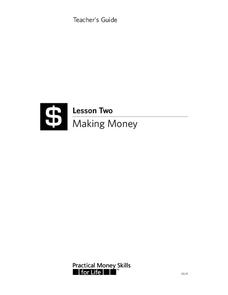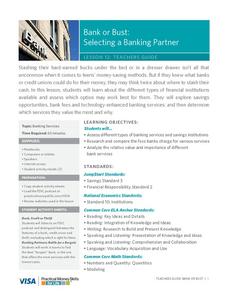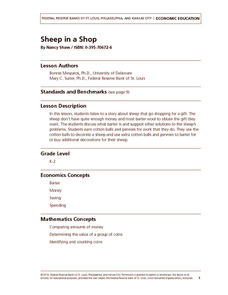Youthlinc
Financial Literacy: Money Attitudes Lesson Plan
Going once, going twice, sold! An auction provides class members with an opportunity to examine their attitudes toward money. After bidding on and purchasing items, individuals complete an attitude survey and then identify a...
US Mint
Coin Connections
Help young mathematicians make cents out of the US currency system with this two-part math lesson. Children first learn the names and values for each type of coin, before learning to count and compare the values of coins using the...
Visa
Allowances and Spending Plans
Help youngsters understand how to manage small amounts of money by discussing an allowance and the difference between spending, saving, and giving.
Encyclopedia Britannica
Do the Campaign Math
Follow the money trail! As part of their study of the 2020 Presidential campaign, class members to research how much money candidates have raise and spent, as well as the sources of the funds. They then graph their findings to compare...
Federal Reserve Bank
The Case of the Shrunken Allowance
An allowance is an important thing! Make sure your kids know how to save and spend their own money. Using the book The Case of the Shrunken Allowance as a starting point, this plan covers income, spending and saving, counting, and more.
SaveandInvest.org
Introduction to Earning Interest: Middle School
Does your bank pay you for allowing them to hold your money? Class members research three different ways they can earn money using money already in the bank. Topics include certificates of deposit, statement savings accounts, and...
Federal Reserve Bank
The Pickle Patch Bathtub
What do your pupils want to save up their money for? Based around the book The Pickle Patch Bathtub, this lesson covers opportunity cost, saving, and spending. Learners participate in a discussion and practice making their own...
Visa
Earning Money
Where does money come from? Is it limitless and always available? Introduce your youngsters to the concept of earning through jobs and/or chores with a matching activity and provided worksheets.
SaveandInvest.org
Introduction to Earning Interest: Grades 9-10
Does your bank pay you for allowing them to hold your money? The lesson covers three different ways your money can make money. Topics include certificates of deposit, statement savings accounts, and money market accounts.
SaveandInvest.org
Introduction to Earning Interest: Grades 11-12
Does your bank pay you for allowing them to hold your money? Class members investigate three different ways money can make more money. Topics include certificates of deposit, statement savings accounts, and money market accounts....
Illustrative Mathematics
Discounted Books
Adolescents love to shop, especially when an item is discounted. Here, shoppers only have a set amount of money to spend. Will they be able to make a purchase with the discount and tax added in? Percent discounts can be calculated...
EngageNY
The Million Dollar Problem
Who wouldn't want to be a millionaire? The 34th installment of a 35-part module prompts young economists to calculate the monthly payments necessary to save a million dollars by age 40. As with car loans, annuity payments, and mortgages,...
Carolina K-12
Personal Financial Literacy: Saving and Investing
When should you save, and when should you invest? In considering this question, your class members will also learn about the time value of money, inflation, compounded interest, and income/growth investments. The resource also outlines...
Visa
Making Money
From evaluating the current employment market to building a resume, pupils are introduced to the wide and varied elements of career planning.
EngageNY
Volume and Cavalieri’s Principle
Take a slice out of life. The ninth section in a series of 23 introduces classmates to Cavalieri's principle using cross sections of a cone and stacks of coins. Class members participate in a discussion using pyramids and how Cavalieri's...
Visa
Dream Big: Money and Goals
Whether their objective is independent living, going to college, or buying a car, pupils will participate in discussions and complete worksheets to gain an understanding of how short- and long-term goals play a large role in helping...
Teach Engineering
Show Me the Money
Class members learn how to estimate the total costs involved to design and build a bridge by including design, material, equipment, and labor costs. The activity includes a discussion about the trade-off between cost and aesthetics.
EngageNY
Simple Interest
An interesting lesson helps young financial wizards determine the amount of money earned via interest. The resource introduces the concept of simple interest to show how money can grow. Pupils use their knowledge of percents to solve...
American Statistical Association
Exploring Geometric Probabilities with Buffon’s Coin Problem
Scholars create and perform experiments attempting to answer Buffon's Coin problem. They discover the relationships between geometry and probability, empirical and theoretical probabilities, and area of a circle and square.
Visa
Bank or Bust: Selecting a Banking Partner
Why shouldn't we just save all our money in our mattress? Couldn't our money disappear? Pupils discover the benefits of utilizing banks and credit unions for saving money, as well as how to evaluate different types of...
Visa
Nothing But Net: Understanding Your Take Home Pay
Introduce your young adults to the important understanding that the money they receive from their paychecks is a net amount as a result of deductions from taxes. Other topics covered include federal, state, Medicare and social...
Visa
Make It Happen: Saving for a Rainy Day
Every little penny counts, especially when it comes to saving for emergencies or long-term goals. Pupils evaluate different saving and investment strategies, such as a CD or money market account, through worksheets and by...
Curated OER
Data Analysis, Probability, and Discrete Math
Choose to supplement your probability unit with this resource and you won't be disappointed with the outcome. Teach young mathematicians to organize information using tree diagrams and lists in order to determine the possible outcomes of...
Federal Reserve Bank
Sheep in a Shop
What do you think sheep might be able to barter when they don't have quite enough to buy a gift? Your pupils can find out this and much more during this activity about Sheep in a Shop, spending, saving, and bartering.
Other popular searches
- Money Math
- Money Math Centers
- Three Little Pigs Money Math
- Money Math Worksheets
- Counting Money Math
- Money Math Activities
- Money Math Match
- Subtracting Money Math
- Math Money Lessons
- Counting Money Math Lessons
- Money Consumer Math
- Money Math and Music




